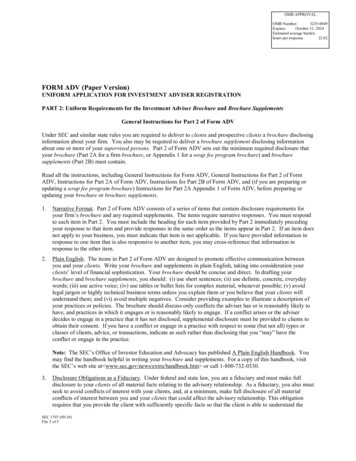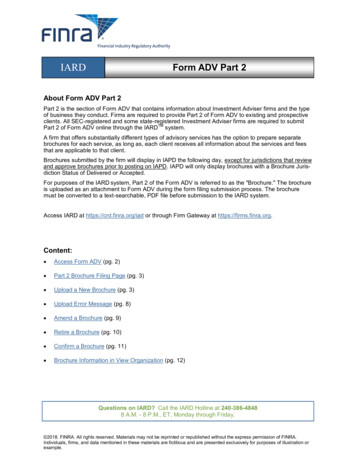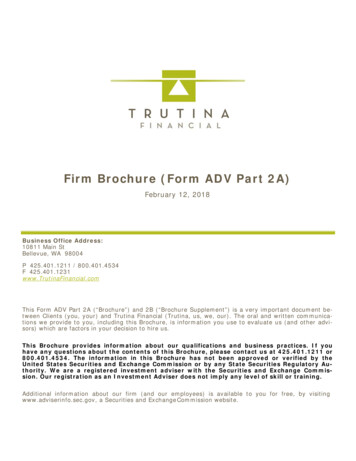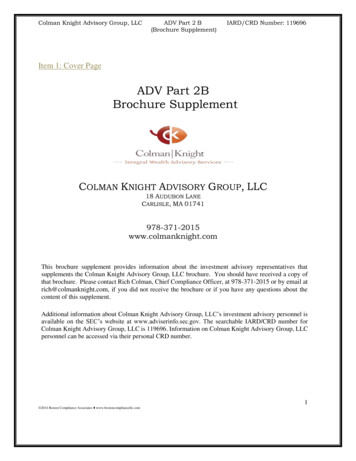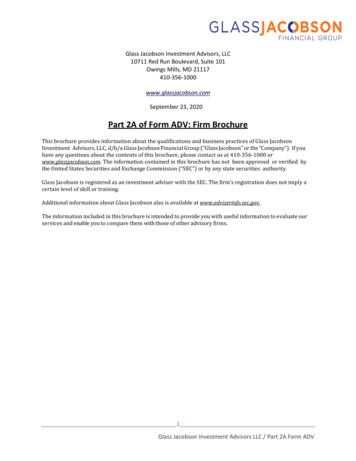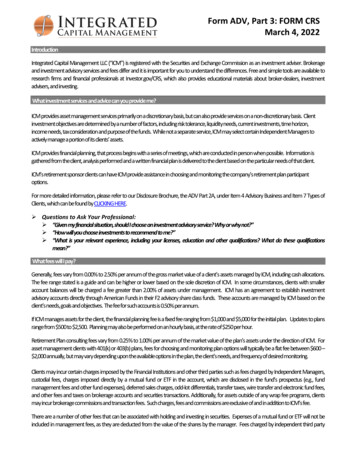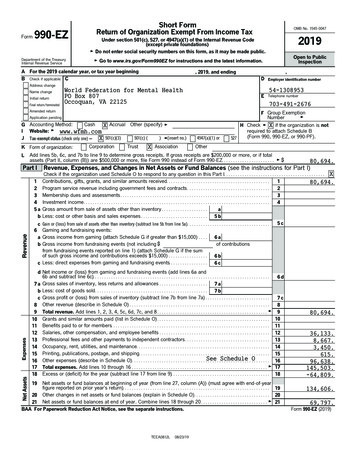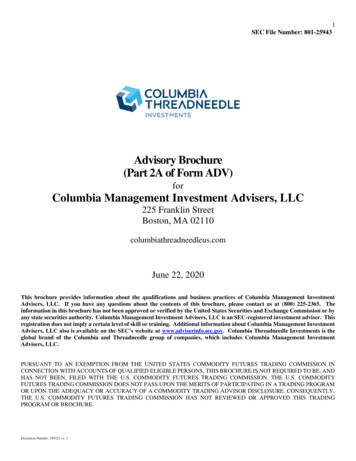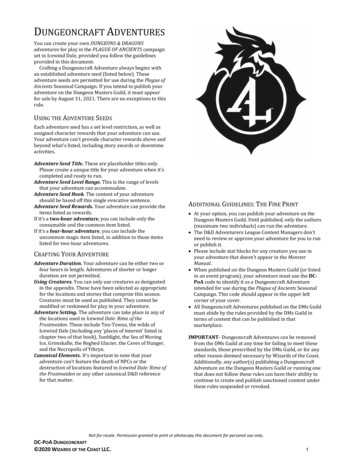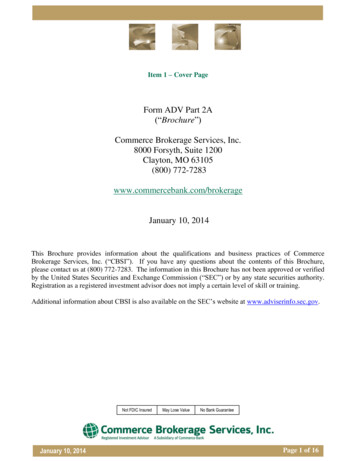
Transcription
Item 1 – Cover PageForm ADV Part 2A(“Brochure”)Commerce Brokerage Services, Inc.8000 Forsyth, Suite 1200Clayton, MO 63105(800) 772-7283www.commercebank.com/brokerageJanuary 10, 2014This Brochure provides information about the qualifications and business practices of CommerceBrokerage Services, Inc. (“CBSI”). If you have any questions about the contents of this Brochure,please contact us at (800) 772-7283. The information in this Brochure has not been approved or verifiedby the United States Securities and Exchange Commission (“SEC”) or by any state securities authority.Registration as a registered investment advisor does not imply a certain level of skill or training.Additional information about CBSI is also available on the SEC’s website at www.adviserinfo.sec.gov.Not FDIC InsuredJanuary 10, 2014May Lose ValueNo Bank GuaranteePage 1 of 16
Item 2 – Material ChangesSince the filing of its last Form ADV Part 2A in April 2013, Jeff Burgess has been appointed President of CommerceBrokerage Services, Inc.A copy of our Brochure may be requested by contacting our Chief Compliance Officer at (314) 746-8791. Our Brochure isalso available on our web site (www.commercebank.com/brokerage), free of charge.January 10, 2014Page 2 of 16
Item 3 – Table of ContentsItem 1 - Cover Page . .1Item 2 - Material Changes .2Item 3 - Table of Contents .3Item 4 - Advisory Business . .4Item 5 - Fees and Compensation .5Item 6 - Performance-Based Fees and Side-by-Side Management. .9Item 7 - Types of Clients . . .9Item 8 - Methods of Analysis, Investment Strategies and Risk of Loss . 9Item 9 - Disciplinary Information .11Item 10 - Other Financial Industry Activities and Affiliations . . .12Item 11 - Code of Ethics, Participation or Interest in Client Transactions andPersonal Trading . . . .13Item 12 - Brokerage Practices . .13Item 13 - Review of Accounts .14Item 14 - Client Referrals and Other Compensation .15Item 15 - Custody .15Item 16 - Investment Discretion .15Item 17 - Voting Client Securities . .16Item 18 - Financial Information . .16Item 19 - Requirements for State-Registered Advisers .16January 10, 2014Page 3 of 16
Item 4 – Advisory BusinessThe CompanyCommerce Brokerage Services, Inc. (“CBSI”) is a registered securities brokerage firm, a federally registered investmentadvisor, and a licensed insurance agency. Registration as an investment advisor does not imply a certain level of skill ortraining. CBSI was founded in October 1985 and has been doing business as an investment advisor since January 2002.CBSI is registered with the Securities and Exchange Commission. CBSI is a member of the Financial Industry RegulatoryAuthority (“FINRA”) and the Securities Investor Protection Corporation (“SIPC”). CBSI is actively engaged in the securitiesbusiness and offers a full range of investment products, including annuities.CBSI is a wholly owned subsidiary of Commerce Bank, which in turn is wholly owned by Commerce Bancshares, Inc., apublicly held bank holding company. CBSI is an affiliate of Commerce Investment Advisors, Inc. (“CIA”), a RegisteredInvestment Advisor, which is the advisor to the Commerce Funds, a Registered Investment Company.ServicesCBSI provides the following advisory services and analysis to individuals: 1) analysis of current customer non-advisorinvestment holdings, 2) non-advisor investment account holdings summary 3) research regarding a specific investmentaccount related matter and 4) non-discretionary advisory services.CBSI will act in the capacity as program sponsor and as a sub-advisor for Clients who wish to establish accounts to bemanaged on a discretionary basis by associated persons of The Commerce Trust Company, a division of Commerce Bank,(“CTC”), Envestnet Asset Management, Inc. (“Envestnet”) or other independent asset managers (“Sub-Advisor”).CBSI has entered into an agreement with CTC and Envestnet to provide Clients with both discretionary investment advisoryservices and operational support services. CBSI may act in more than one capacity, including as the program sponsor, aClient's primary advisor, or a sub-advisor. Envestnet may also act in more than one capacity, including co-advisor to Clientalong with CBSI, portfolio manager, overlay manager or a sub-advisor.Envestnet has also been retained to provide operational and support services, which includes the use of any systems providedby or through Envestnet. These systems provide asset performance analysis, customer diagnostic reports, and periodicaccount reports. This support and use of Envestnet’s systems will also be available to non-discretionary accounts.The ProgramsCBSI will introduce qualified Clients to the Commerce Horizons program (“Program”). CBSI, in offering the CommerceHorizons program to Clients, provides professionally managed, fee-based advisory programs through an arrangement withCTC, Envestnet and other Sub-Advisors.The Commerce Horizons program offers three types of advisory account programs. The Fund Manager Account (“FMA”), for which CTC will provide management on a discretionary basis. The Portfolio Manager Account (“PMA”), for which Envestnet will provide management on a discretionary basis. The Investment Manager Account (“IMA”), for which CBSI will provide services on a non-discretionary basis, andwhich will be managed by designated Sub-Advisor(s) on a discretionary basis.The investments in a FMA will be primarily mutual funds and exchange traded funds (“ETFs”). The investments in a PMAwill be primarily stocks, ETFs and mutual funds. The investments in an IMA will be primarily equity securities andequivalents and fixed income securities. Mutual fund investments in a Program account are limited to investment company“no-load” or “load-waived” share classes, or the equivalent.Program accounts are professionally managed fee-based accounts where the Client pays an annual fee (“Advisory Fee”) forinvestment management and advisory services. CBSI receives a portion of the Client’s Advisory Fee for Program accounts.January 10, 2014Page 4 of 16
CBSI also manages accounts on a transaction basis under the broker-dealer where clients are charged a commission and orsales charge for each transaction. Based on the total assets in the Program, each Client is able to establish the cost of theservices provided through the Program and compare such costs to the costs of similar services provided by other programs.A Client may invest at a lesser overall fee or cost by investing in the market directly and incurring normal brokerage andtransaction charges or by investing in mutual funds with similar objectives as the funds available through this Program.Details about the Advisory Fee can be found in the Fees and Compensation section.Clients will receive from National Financial Services, LLC (“NFS”) monthly/quarterly statements detailing each Client'ssecurities and cash balances, deposits, withdrawals, transactions, charges or transfers. Clients will also receive aconfirmation for transactions cleared through NFS. Clients may elect to receive a quarterly confirmation report in lieu ofreceiving individual trade by trade confirmations. Upon request Clients may have access to their CBSI account(s) online.Commerce Horizons accounts will receive a quarterly performance report (“Quarterly Report”) prepared by Envestnet at theend of the quarter in which a new account has been brought under management and every quarter thereafter. This report, inconjunction with the statements from NFS, provides a list of the securities in the Client's portfolio, the quantity of thepositions, the cash balance, the market prices as of the date of the report, the total portfolio valuation and an Advisory Feeinvoice.At least annually, CBSI or the Financial Advisor will contact each Client to determine whether there have been any changesin the Client's financial situation or investment objectives, and whether the Client wishes to impose any reasonablerestrictions on the management of the Program account or reasonably modify existing restrictions. In addition, Clients willbe notified quarterly to contact the Financial Advisor, in order to confirm whether there have been any changes to the Client’sfinancial situation, investment objectives or if Client would like to impose or modify investment restrictions on the account.The Program is intended to comply with Rule 3a-4 under the Investment Company Act of 1940. Each Client’s account ismanaged on the basis of the Client’s financial situation and stated investment objectives, in accordance with any reasonableinvestment restrictions imposed by the Client on the management of the assets in the account.CBSI offers advisory services on a non-discretionary basis to its Clients and as of January 8, 2014 has 239.7 million assetsunder management in the Commerce Horizons program.TerminationClient has the right to cancel the Investment Advisory Agreement (“IAA”) within five (5) business days from the date theFinancial Advisor, on behalf of CBSI, agrees to and accepts the Program’s IAA. Client must provide written notice of suchcancellation to CBSI. In such event, any Advisory Fee paid by the Client shall be refunded to the Client.However, the Client shall be responsible for any transactions executed, market fluctuations, custodial (IRA) fees, or accountfees prior to CBSI’s receipt of the written cancellation notice.The IAA may be terminated by either party upon thirty (30) days prior written notice to the other party. If the IAA isterminated and all Program assets are withdrawn from the Program account prior to the end of a quarter, the pro-rata portionof the Advisory Fee will be reimbursed to the Client.Item 5 – Fees and CompensationFeesThe Advisory Fee is calculated and charged in advance based on the prior quarter’s period ending balance of the Programaccount. On a quarterly basis Envestnet calculates Program account Advisory Fee and issues instructions to NFS, which isauthorized to deduct the Advisory Fee directly from the Client’s Program account.The initial Advisory Fee for the first calendar quarter (or part thereof) in which the Client participates in the Program shall becalculated and debited on the 10th day of the month (or the next business day if the 10th is a non-business day) after Programaccount’s start date and shall be the Advisory Fee for the first calendar quarter (or part thereof) in which the Clientparticipates in the Program. The initial Advisory Fee for any partial calendar quarter shall be appropriately pro-rated based onJanuary 10, 2014Page 5 of 16
the number of calendar days in the partial quarter. Thereafter, the Advisory Fee shall be calculated at the beginning of eachcalendar quarter based on the value of Program account on the last business day of the prior calendar quarter and debitedfrom the Program account on the 10th of January, April, July, October (or the next business day if the 10 th is a non-businessday).If a Program account is opened in the last month of a calendar quarter, the Advisory Fee will be calculated and debited for theremaining period in the calendar quarter plus the next calendar quarter on the 10th day of the month (or the next business dayif the 10th is a non-business day) after Program account’s start date. For example, an account that opened on 9/15/13 wouldhave fees debited on 10/10/13 for the periods (9/15/13 – 9/30/13) and (10/01/13 – 12/31/13).If a Client invests 10,000 or more in any Program account after the beginning of a calendar quarter, the Advisory Fee forthat quarter will be recalculated and pro-rated as of the day of the additional investment. The Advisory Fee will be debitedon the 10th day of the month (or the next business day if the 10th is a non-business day) following the month the additionalinvestment is made to the Program account.If a Client withdraws 10,000 or more in any Program account after the beginning of a calendar quarter, the Advisory Fee forthat quarter will be recalculated and pro-rated as of the day of the withdrawal. The pro-rated Advisory Fee for that withdrawwill be credited on the 10th day of the month (or the next business day if the 10th is a non-business day) following the monththe withdraw is made from the Program account. If a Client makes a partial withdraw less than 10,000 from the Programaccount after the beginning of a calendar quarter, the Client will not be credited back any portion of the Advisory Feepreviously paid by the Client on the withdrawn Program assets.The Advisory Fee will be based on the fair market value of the Program assets as calculated on the last business day of theprevious calendar quarter. Envestnet will determine fair market value for Advisory Fee calculation purposes.The Advisory Fee associated with this Program, as detailed in the enclosed Annual Fee Schedules and indicated in theAnnualized Fee column of each Annual Fee Schedule, includes all CTC, Envestnet, Sub-Advisor and CBSI costs that may beincurred in a Client's Commerce Horizons account, including the cost of transactions and other fees normally associated witha managed advisory account.CBSI will rebate back to the Client’s Program account, on a quarterly basis, the Client’s pro-rata share of any managementfees charged by CIA for any Commerce Funds held in the Program account.CBSI and Envestnet will not charge an Advisory Fee that is more than six months in advance. The Advisory Fee will becharged quarterly unless otherwise agreed by all parties in advance.The Advisory Fee is negotiable and may differ between Client’s holding similar portfolios or having the same size of assetsunder management, regardless of the type of Program account selected. There are other factors that may impact the feescharged on an account including, prior business relationships, the anticipated number or volume of trades and anticipatedfuture services.Clients with multiple Commerce Horizons accounts (as owner or for their benefit), and household accounts for theirimmediate family members (such as, spouse and legal dependents residing at the same address) may request CBSI to linkProgram accounts (Fund Manager, Portfolio Manager, and Investment Manager) for Advisory Fee calculation purposes.Program accounts may only be linked if the underling Program accounts are subject to the standard Advisory Fee as outlinedin each Annual Fee Schedule enclosed. Only accounts in the same program can be linked together for Advisory Feecalculation purposes. For example, Fund Manager Accounts can only be linked together with other Fund Manager Accounts;and Portfolio Manager Accounts can only be linked together with other Portfolio Manager Accounts. A Fund ManagerAccount and a Portfolio Manger Account may not be linked together for Advisory Fee calculation purposes. By linkingProgram accounts, a portion of the combined accounts may qualify for the next lower Advisory Fee level, which would ineffect reduce the overall account fee compared to the Advisory Fee payable if each account were calculated separately.Program accounts with a negotiated Advisory Fee may not be eligible to be linked for Advisory Fee calculation purposes.January 10, 2014Page 6 of 16
A Client may deposit or transfer securities into a Program account and place a restriction on the sale or liquidation of aparticular security by requesting CBSI to hold the security in the account, but outside of the Program (“UnsupervisedAssets”). A limited number of Unsupervised Assets may be held on a temporary basis in a Program account and will not besubject to the Advisory Fee. Unsupervised Assets will be indicated on the Quarterly Report; however, Unsupervised Assetswill not be included in the performance of the Program on the Quarterly Report. CBSI, in its sole discretion, reserves theright to require the Client to move the non-managed Unsupervised Assets to a CBSI brokerage account.CBSI may accept accounts below the preferred account opening minimum asset value, as specified in the fee schedulesenclosed, based upon a number of factors including the Client's anticipated future additions to the account(s) and totalinvestment relationship with CBSI.Fund Manager Account (“FMA”)The preferred opening minimum account value for each FMA is 35,000 of cash or securities. Each FMA will be required tomaintain a balance of at least 3 percent in cash or cash equivalents.FMA Annual Fee ScheduleAnnualized Fee*1st 75,0002.20%Next 175,0002.10%Next 250,0001.90%Next 500,0001.65%Next 1 million1.45%Over 2 million1.30%“*” Annualized Fee column represents the maximum investment management fee CBSI will charge the Client.Portfolio Manager Account (“PMA”)The preferred opening minimum account value for each PMA is 250,000 of cash or securities. Each PMA will maintain abalance in cash or cash equivalents, typically ranging between 2 and 5 percent.PMA Annual Fee ScheduleAnnualized Fee*1st 500,0002.55%Next 500,000Next 1 millionOver 2 million2.30%2.10%1.90%“*”Annualized Fee column represents the maximum investment management fee CBSI will charge the Client.Investment Manager Account (“IMA”)The preferred opening minimum account value for an IMA is typically 200,000 of cash or securities for each Sub-Advisor.In addition, the minimum investment required by each individual Sub-Advisor(s) must be met. Each IMA will maintain,based upon the Sub-Advisor's investment style, a balance in cash or cash equivalents, typically ranging between 2 and 5percent.Each IMA will typically have one account established for each individual Sub-Advisor (“Sub-Account(s)”). In addition, oneaccount will typically be established to act as the conduit for all funds or securities moving in and out of the IMA andbetween Sub-Advisor(s) (“Master Account”). There are no management fees for assets held in the Master Account.January 10, 2014Page 7 of 16
IMA Annual Equity & Balanced Fee ScheduleIMA investments held in the equity and balanced Sub-Advisor’s Sub-Account(s) are subject to the IMA Annual Equity &Balanced Fee Schedule:1st 500,000Next 500,000Next 4 millionOver 5 millionAnnualized Fee*2.75%2.45%2.15%1.80%IMA Annual Fixed Income Fee ScheduleIMA investments held in the fixed income Sub-Advisor’s Sub-Account(s) are subject to the IMA Annual Fixed Income FeeSchedule:Annualized Fee*1st 500,0002.15%Next 500,0001.80%Next 4 million1.65%Over 5 million1.45%“*” Annualized Fee column represents the maximum investment management fee CBSI will charge the Client on the entireIMA, inclusive of CBSI, Envestnet, and Sub-Advisor fees. Clients with multiple Sub-Accounts will receive a combinedweighted average Annualized Fee based on each Sub-Account’s respective Annual Fee Schedule.Other FeesClients, who either do not participate in the Commerce Horizons program or who have accounts not part of the CommerceHorizons program (i.e. CBSI brokerage accounts), will be subject to and incur the normal brokerage fees and transactioncharges for their non-Commerce Horizons program accounts. CBSI and its agents receive compensation from non-advisorybusiness (brokerage accounts) in the form of commission or sales charges. Due to this, CBSI agents may have a conflict ofinterest in recommending a non-advisory, transaction based, brokerage account instead of an advisory account based on theamount of compensation agents may receive, rather than on the client’s best interest. CBSI prohibits charging a commissionon a transaction for a security that is being managed in a Commerce Horizons account.Transaction fees for Client self directed investments that are not included in the Commerce Horizons program, such asUnsupervised Assets, are subject to the standard CBSI brokerage fees or charges.Clients opening a qualified account, such as an IRA or other qualified account, are subject to the fees and charges from theaccount custodian, which is NFS. All applicable fees are detailed for this type of account in the NFS Premiere SelectCustodial Agreement and Disclosure Statement.Client self-directed purchases of a specific mutual fund or security, which is not part of the Program account portfolio, willbe charged either a sales charge (front-end, contingent, or no fee in the case of a no-load fund) established by the fundcompany and detailed in the fund's prospectus or a commission, as detailed in the CBSI commission schedule.Certain charges may be imposed by outside third-parties in connection with investments held in the Program account. Theseinclude the following types of charges: mutual fund 12b-1 fees, mutual fund management fees, mutual fund short-termredemption fees, issuer administrative servicing fees, certain deferred sales charges on previously purchased mutual funds,other transaction charges and service fees, and IRA and Qualified Retirement Plan fees. Other parties may also receive aportion of these outside third-party fees. Further information regarding charges and fees assessed by an investment company,other securities sponsor, or portfolio manager is available in the appropriate prospectus or disclosure statement.In addition to the fees and charges described above, a Client may incur redemption fees, when the portfolio manager to aninvestment strategy determines that it is in the Client’s overall interest, in conjunction with the stated goals of the investmentstrategy, to divest from certain mutual funds prior to the expiration of the minimum holding period of the mutual funds.January 10, 2014Page 8 of 16
Some mutual funds also assess redemption fees to investors upon the short-term sale of its funds. Depending on theparticular mutual fund, this may include sales for rebalancing purposes. Please see the prospectus for the specific mutualfund for detailed information regarding such fees and charges.The Envestnet Form ADV Part 2A Narrative Brochure and the IAA detail the circumstances where CTC, Envestnet, NFS orCBSI may receive additional remuneration, either direct or indirect, for transactions or money market investments. CBSIcould indirectly be a beneficiary of Envestnet or NFS remuneration by virtue of it being a fully-disclosed broker-dealer withNFS.CBSI or any of its affiliates may receive additional fees, including management fees, 12b-1 fees or administration fees forservices performed in the capacity of an investment advisor, or in any other capacity, for any mutual fund, including theCommerce Funds. In addition, the mutual funds, including the Commerce Funds, may purchase securities from or enter intorepurchase agreements with CBSI or its affiliates.CompensationCBSI, its agents, CTC, Envestnet and Sub-Advisor(s) (if applicable) will be compensated under a percentage of assetsmethod for the Program. The Advisory Fee for this Program is charged quarterly in advance based on the prior quarter’speriod ending balance.The Advisory Fee will vary by the type of Program account and by the value of the Program account. CBSI, its agents, CTC,Envestnet and Sub-Advisor(s) (if applicable) will be compensated based upon the established fee schedules in this document.The amount of compensation received may vary based on the Program selected and may also be more or less thancompensation received from a traditional commission based CBSI brokerage account. The portion of compensation receivedby CBSI which is paid to the Financial Advisor may vary based upon changes to the CBSI Financial Advisor incentiveprograms, bonus compensation plans or attained production level.Item 6 – Performance-Based Fees and Side-by-Side ManagementCBSI does not charge any performance-based fees (fees based on a share of capital gains on or capital appreciation of theassets of a Client). CBSI does not charge hourly or flat fees to provide advisory services.Item 7 – Types of ClientsCBSI provides investment advice tailored to individuals, banks and thrifts institutions, pension and profit sharing plans,trusts, estates, charitable organizations, corporations and business entities not specifically mentioned in the precedingcategories.Additional requirements for opening and maintaining a Commerce Horizons account, including the minimum accounts size,can be found in the Services, Fees and Compensation section and the Client Information Provided to Portfolio Managerssection.Item 8 – Methods of Analysis, Investment Strategies and Risk of LossCBSI offers advisory services on a non-discretionary basis to its Clients.Investment StrategiesThe investment strategies may differ based on each discretionary manager’s strategies associated with the Fund Manger,Portfolio Manager or Investment Manger Accounts.January 10, 2014Page 9 of 16
CTCThe CTC Investment Policy Team’s investment philosophy is based on the following three tenets: Asset allocation is the primary determinant of whether Clients achieve their financial goalso Stock, bond, cash, etc. mix Diversification within each asset class is essential to achieve more consistent performanceo By investment style (value, growth, etc.)o By active/passive managemento By manager/strategy Periodic adjustments in Client portfolios are necessary to reflecto Client’s evolving objectiveso Medium/longer-term changes in the economic outlookCTC’s asset allocation process starts with rigorous analysis of historical asset class behavior. They use this information toarrive at forecasts for expected returns and volatility for the various available asset classes. The CTC team applies theseforecasts to develop return streams (with embedded correlations) and volatility for each asset class for testing purposes. Thisis accomplished by incorporating their forecasts into historical data in order to capture actual market behavior. They alsocharacterize and quantify investor risk perceptions and preferences and then quantitatively search for asset class mixes thatwill maximize client satisfaction (utility) with the expected portfolio behavior. CTC then stress tests their models andassumptions using sensitivity analysis. The end goal is to formulate asset combinations that lie on the “efficient frontier,”which is the theoretical curve that presents the maximum investor utility at each risk/return tradeoff point.The CTC portfolio manager selection process and due diligence effort involves quantitative and qualitative research fromtheir consultant and other providers, plus their own analysis by CTC teams of quantitative and manager research analysts. Toassist CTC in their research, they have developed some unique proprietary quantitative tools that they believe give them anedge in portfolio manager selection and monitoring. Three CTC teams of senior investment professionals (Equity Strategy,Fixed Income Strategy and Alternative Investment Strategy) are involved in and make all decisions in this process.EnvestnetThe Envestnet research team uses proprietary analytical tools and commercially available optimization software applicationsto develop its asset allocation strategies. Factors used as inputs in the asset allocation process include historical rates of riskand return on various asset classes, correlation across asset classes, and risk premiums, among others.Envestnet employs a rigorous multiphase approach to researching and selecting portfolio managers suitable for participationin its investment programs (“Approved Sub-Managers”). Approved Sub-Managers are evaluated using data and informationfrom several sources, including the manager and independent databases. Among the types of information analyzed arehistorical performance, investment philosophy, investment style, historical volatility and correlation across asset classes.Also reviewed are the manager’s Form ADV Part 2A, as well as portfolio holdings reports that help demonstrate themanager’s securities selection process. To ensure accuracy, Envestnet attempts to verify all information by comparing it topublicly available sources.The investment professionals at the investment management firms are a primary source of information to Envestnet,providing quantitative and qualitative information. In addition, Envestnet employs several publicly available databases fromindependent sources, including but not limited to Nelson’s Directory of Investment Managers, the Mobius M-Searchdatabase, Morningstar’s Principia application, Bloomberg and Russell Mellon. These databases are used to verify theinformation provided by the managers.Methods of AnalysisClients establishing a Program account with CBSI will be given advice utilizing one or more methods of analysis includingcharting, fundamental analysis or technical analysis in addition to the analytical tools and reports available using the systemsprovided by or through Envestnet or CTC.CBSI provides “no cost or obligation” consumer education utilizing the CBSI’s Financial Needs Analysis Tool. This serviceis provided at no cost or obligation to the individual and is not part of or constitute a financial plan or service.January 10, 2014Page 10 of 16
CBSI provides the following advisory services and analysis to individuals: 1) analysis of current customer non-advisorinvestment holdings, 2) non-advisor investment account holdings summary and 3) research regarding a specific investmentaccount related matter.CBSI offers many product offerings and tools including Financial Needs Analysis and Portfolio Analysis.Financial Needs AnalysisCBSI provides a variety of needs analysis capabilities and tools available to its Financial Advisors that are offered throughEnvestnet and other third party providers. They include risk profiling tools as well as various calculator
of the Advisory Fee will be reimbursed to the Client. Item 5 - Fees and Compensation Fees The Advisory Fee is calculated and charged in advance based on the prior quarter's period ending balance of the Program account. On a quarterly basis Envestnet calculates Program account Advisory Fee and issues instructions to NFS, which is

